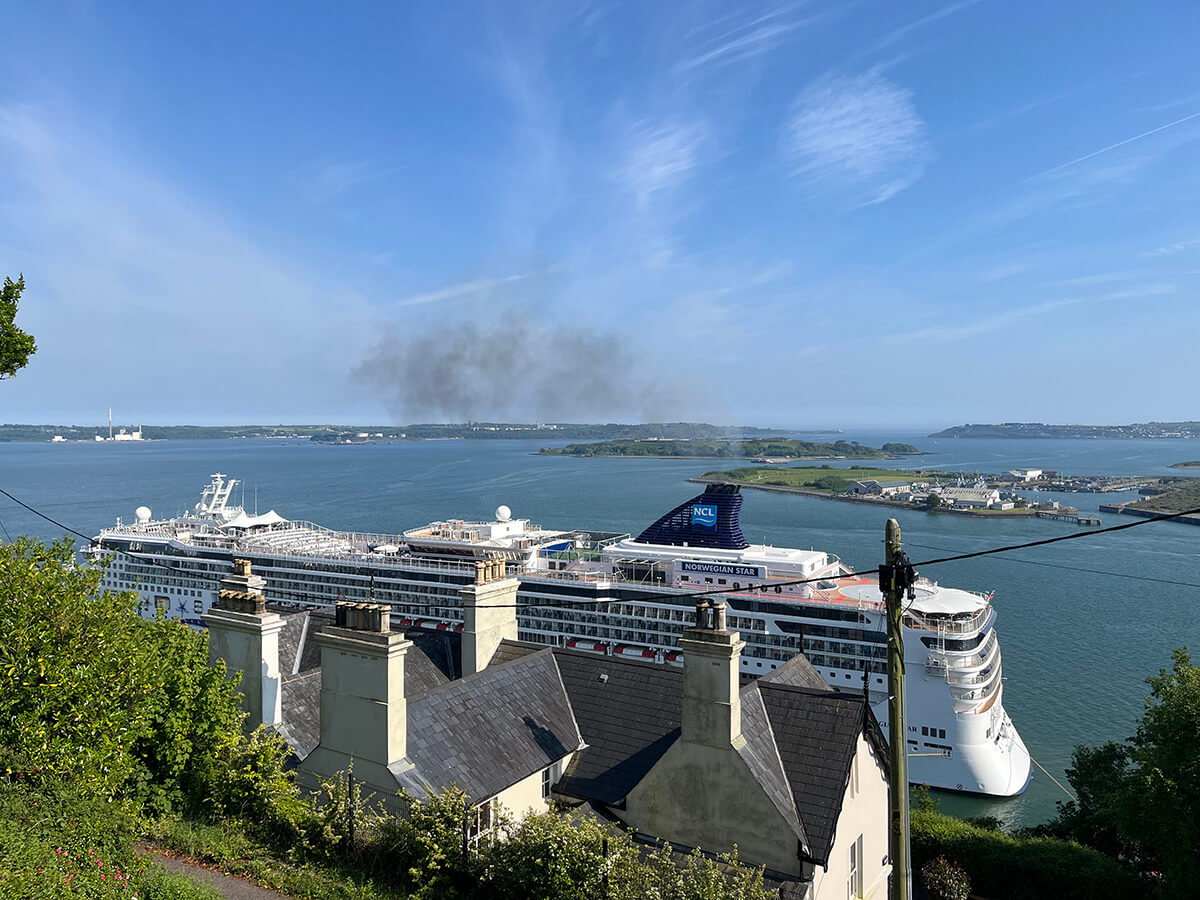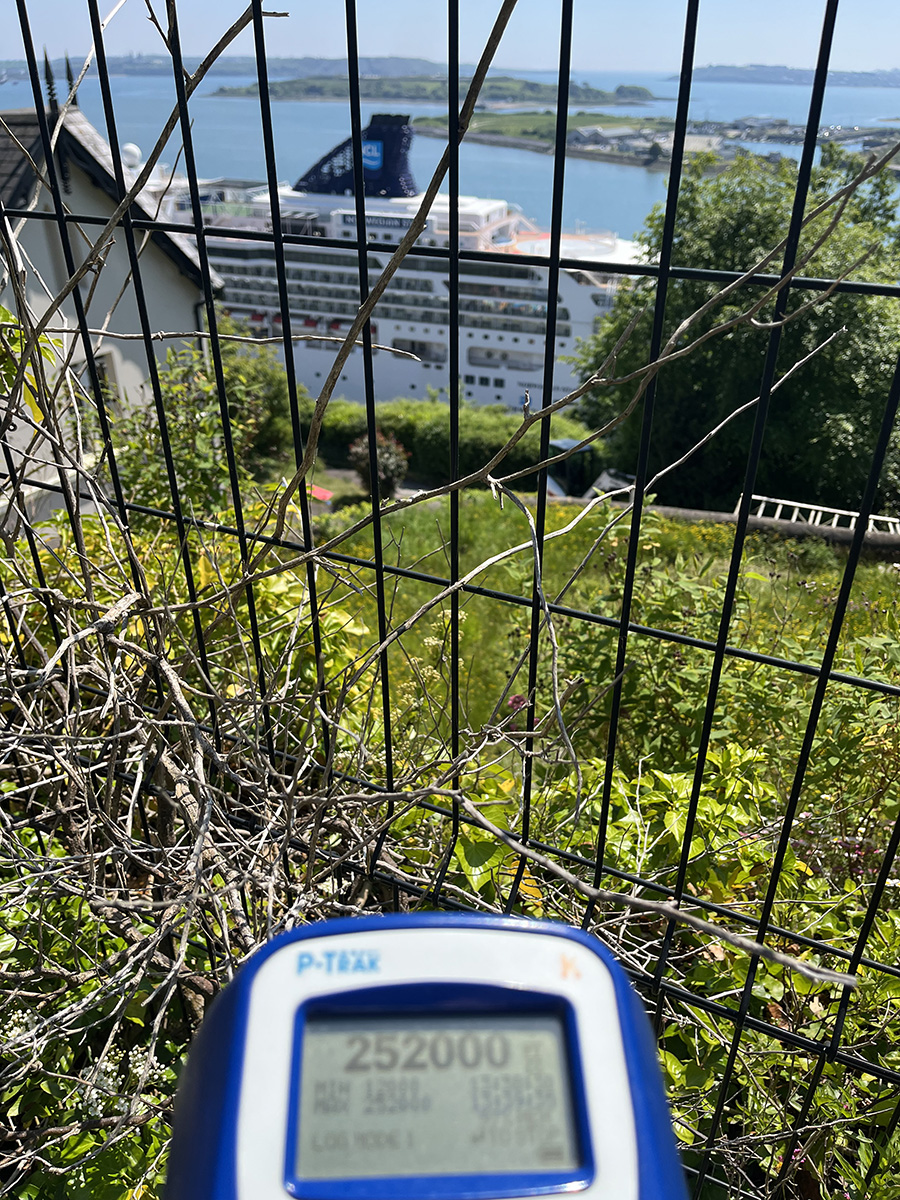
New air quality measurements in Cork Harbour, show that ships cause high pollution of residential areas with toxic ultrafine soot particles
- Report: Air quality measurements: Cruise ship pollution in Cork, May 2025.
- Photographs – free to download and use
- Video 1
- Video 2
Cork, May 22, 2025: Air quality measurements taken last week when cruise ships – such as NCL’s Norwegian Star – visited Cobh, in Ireland’s Cork Harbour, show air pollution levels up to more than 250 times higher than safe levels recommended by the World Health Organization (WHO).
The measurements, taken by Kåre Press-Kristensen, senior advisor on air quality & climate at Green Global Future, found pollution levels of ultrafine particles from cruise ships in residential areas of up to 250,000 particles per cm3 compared to the levels 1,000/cm3 considered safe by WHO. Many measurements showed levels of 100 times safe levels, suggesting that residents are regularly exposed to high levels of air pollution.
Such pollution increases the risk of strokes, cardiovascular diseases, lung diseases, cancer, and as a result, the risk of premature mortality among residents. In addition, soot particles are a key driver for global warming. See also EU Air Quality Standards.
The pollution measurements will be presented during this week’s European Maritime Day at the City Council of Cork on May 22nd from 11.00-12.00 at the stand of the EU-project Life4MECA. Air quality measurements were conducted as part of the EU-project Life4MECA. Green Global Future is a member of the Clean Arctic Alliance.
“To protect residents from the health hazards of burning fossil fuels while cruise ships in port, Cobh must install shore power facilities to reduce the pollution, which will allow ships to connect to the electricity grid instead of idle running and polluting all day”, says Kåre Press-Kristensen, senior advisor on air quality & climate in Green Global Future. “The expenses of installing shore power facilities are paid back by connection fees and electricity sale much faster than many other infrastructure projects. This will eliminate local pollution from ships at berths and improve public health.”

“Earlier this year, Ireland supported the establishment of a new International Maritime Organization Northeast Atlantic Emission Control Area (ECA) extending from the Straits of Gibraltar to Greenland which will reduce air pollution from ships at sea in the North-East Atlantic Ocean”, said Dr Sian Prior, Lead Advisor to the Clean Arctic Alliance. “One benefit of emission control areas is that they require ships to use cleaner fuels which have lower emissions of black carbon – also known as soot.”
“Black carbon particles are lethal to humans when inhaled, but they also drive climate change”, added Prior. When black carbon reaches the Arctic and settles out of the atmosphere, it accelerates melting of snow and ice. The loss of Arctic sea ice and glacier melting is triggering an irreversible climate tipping point which impacts the entire planet. The Northeast Atlantic emission control area, which will include all of Ireland’s waters, was approved by the IMO in April and should require the use of cleaner fuels in 2027 provided it is adopted later this year. It will be important that these measures to reduce air pollution are complemented by onshore power facilities to reduce emissions in ports.”
“Ireland’s Minister for Heath, Jennifer Carroll MacNeill, the Minister for the Marine, Martin Heydon, and the Minister for Tourism, Patrick O’Donovan must take immediate action to protect the health and wellbeing of the residents of Cobh and Cork Harbour and Irish ports more generally from the pollution created by all shipping, including cruise vessels”, said Dave Walsh, Advisor to the Clean Arctic Alliance. “This means cutting the particular matter emitted in ports – by requiring cleaner fuels, and installing portside electricity supplies for use by cruise ships when alongside, the Irish authorities will go a long way towards protecting the health and wellbeing of people living in port areas”.
“Fossil fuels are a major driver of climate change and a direct threat to human health”, said Ola Løkken Nordrum, Irish Doctors for the Environment operators officer. “Globally, air pollution, much of it from burning fossil fuels, causes an estimated seven million premature deaths each year. The link between fossil fuel use and worsening health outcomes is clear. To protect communities in Ireland, particularly those living near ports, we must take decisive action to reduce exposure to air pollution. Limiting cruise ship access to our ports is a natural step. The cruise industry poses a serious risk to public health. Poor air quality in port towns is just one of the many harmful consequences. Cruise ships also bring noise, water pollution, and are significant contributors to greenhouse gas emissions.”
Contact:
Dave Walsh, Communications Advisor, [email protected], +34 691 826 764
About the Clean Arctic Alliance
Made up of 24 not-for-profit organisations, the Clean Arctic Alliance campaigns to persuade governments to take action to protect the Arctic, its wildlife and its people.
Members include: Alaska Wilderness League, Bellona, Clean Air Task Force, Ecology and Development Foundation ECODES, Environmental Investigation Agency, Equal Routes, Eurasian Wildlife and Peoples, Friends of the Earth US, Global Choices, Green Global Future, Green Transition Denmark, Greenpeace, Iceland Nature Conservation Association, International Cryosphere Climate Initiative, Nature And Biodiversity Conservation Union, 90 North Foundation, Ocean Conservancy, Pacific Environment, Seas At Risk, Surfrider Foundation Europe, Stand.Earth, Transport & Environment, WWF and Zero.
More more information visit https://www.cleanarctic.org/

